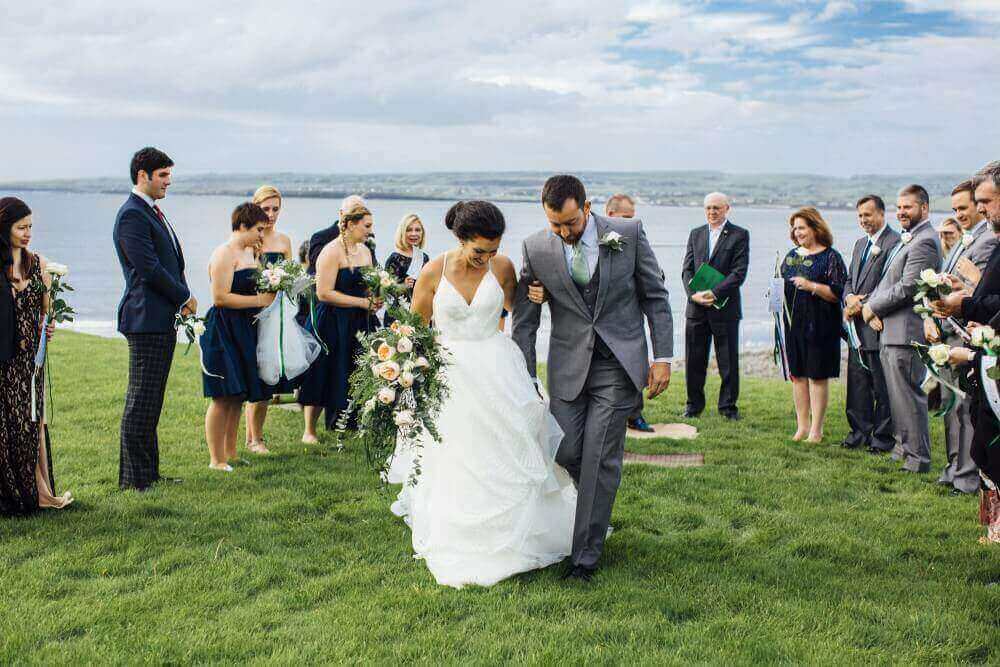
Photo by Larry McMahon Photography
We’re finding many couples are fine with picking out the cake and flowers, but coming to a bit of a block when it comes to their ceremony! Maybe you and your partner are coming from two different faiths and want both equally represented on your wedding day. Maybe you have some cultural traditions you want worked in but don’t know how to merge them into a simple ceremony. Maybe that traditional wedding in a beautiful church was always your dream, but you aren’t sure how to make that happen abroad. Maybe you want a spiritual undertone to the ceremony, but not one that’s extremely strict or too formal. Or maybe you want to do away with the traditional stuff all together and come up with something really unique!
Traditional. Unconventional. What does “spiritual” actually mean? And what is a “humanist” ceremony exactly?!
Waterlily Weddings is here to help you figure out the different kinds of wedding ceremonies out there and how they can work for your destination wedding in Ireland. Be it a huge wedding bash or intimate elopement, we’re certain we can help you craft the ceremony that’s just perfect for you.
Types of Ceremonies
There are a few different types of wedding ceremonies that may fit the bill for what you are envisioning. Ask yourself what’s important to you:
- getting married in a particular faith?
- do I want a ceremony outdoors or in a picturesque setting?
- are there any family or cultural traditions important to us?
- do I want to be the center of attention?
- do I want my guests to be active participants in the ceremony?
- do I want to incorporate anything Irish into the ceremony?
Remember, there’s the legal aspect of getting married as well (be it at home or abroad) and we’re happy to help navigate you through that part too! And if you don’t feel you fit into one of these boxes below don’t worry: there’s always “other” (or as we call it, “bespoke”).
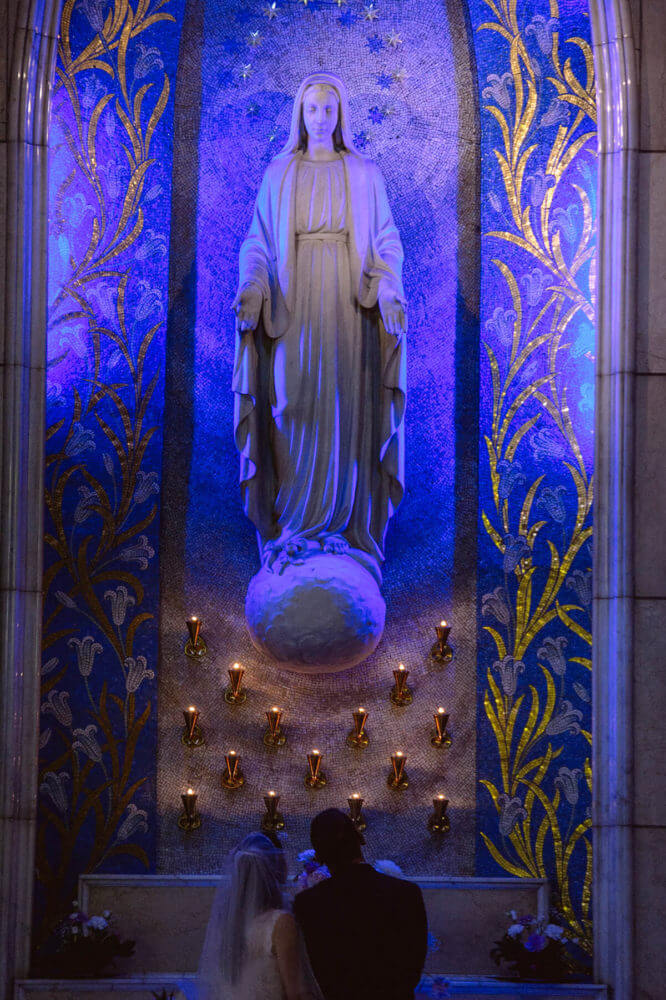
Photo by Shane O’Neil
Traditional
A traditional ceremony goes after a specific script and set of traditions laid out by a particular faith and/or culture. They are usually performed in a house of worship (ex. church, temple, mosque, etc.) and presided over by a licensed religious leader (ex. priest, rabbi). Many religions will require pre-marriage courses or classes so make sure you inquire about that to make sure you schedule enough time for yourselves to complete everything. You will still need to sign the paperwork to be legally married; this can be worked into the religious ceremony either before, during, or immediately after the religious ceremony.
The Pros: Many couples find traditional religious ceremonies appealing because it connects them to their faith, heritage, and cultural traditions; many couples grow up attending weddings in their community, envisioning themselves doing the same on their wedding day. For some couples, the set traditions of the ceremony take out the stress of planning details for this part of their wedding day, enabling them to focus on the reception and other elements of the wedding like the reception.
How We Can Help: Ireland is a predominately Catholic country but does have other faiths represented. We have done quite a few traditional religious weddings, from small chapel ceremonies to big cathedrals as well as other faiths including Jewish and Hindu. We can help you find the right location and venue, help you navigate through the paperwork process (including the legal paperwork), organize any special items and ceremony details needed, and recommend elements to enhance the ceremony like picking the perfect music, lighting, programs, and more.
Spiritual
A spiritual ceremony is still centered around some kind of faith, but is a bit less strict on the rules of how and where it can be performed. Spiritual ceremonies can take place virtually anywhere: indoors, outdoors, under a tree, in a barn, cliff-side, etc; it doesn’t require a religious house to be performed.
The Pros: Spiritual ceremonies are a great option for those couples that have a sense of spiritualism but don’t want something so strict: it affords them generous flexibility as to the location of their wedding and the ceremony details. It’s a great opportunity to personalize an important part of their day — picking readings, poems, songs that mean something for them; writing your own vows; choosing a location that has meaning for you both. They can also give a couple the flexibility to have close family members or friends presiding over rather than a priest or minister.
How We Can Help: This is one area where Waterlily Weddings really excels. We pride ourselves on perfectly matching our couples with the right location and ceremony space for their dream wedding day. Anything from ancient stone circles to castles to the coast, we extract the details of what will make up your dream wedding day and translate them into the perfect space. We can help you find the right celebrant for your day — we are proud to work with amazing licensed celebrants throughout Ireland — or help guide your family or friend who will do the honors. We can work with you to outline your ceremony, work in any Irish traditions or elements if you like, and help source any items you may need (like candles, handfasting chords, music).
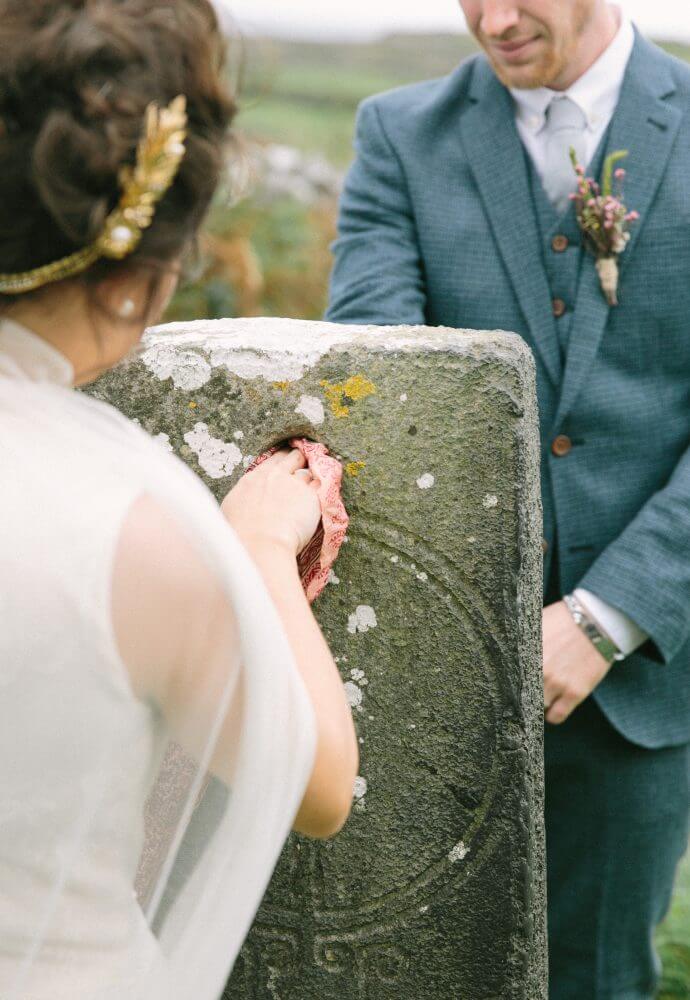
Photo by D’Arcy Benicosa
Ancient Celtic
A really unique option available only in Ireland is having an ancient Celtic marriage ceremony. This ceremony takes heavy inspiration from Nature and the elements, our ancestors, and meaningful Irish tradition. It’s a beautiful ceremony to watch and partake in. You’ll work in incredibly and authentic elements like stones carved by the ancient Celtic people dating back to the Bronze Age. You’ll be able to work in Ireland’s incredible natural beauty as backdrop, ruins, ancient structures built hundreds and thousands of years ago. The ceremony will be extremely meaningful — tailored to your journey together as a couple and focusing on your future together. This ceremony can incorporate some Irish traditions including the hand-fasting, oathing stones, blessing of the rings, and much more. To be considered legally married you will still have to incorporate the legal paperwork as well.
The pros: If you’re not particularly drawn to a specific religion but want your ceremony to feel ritualistic and important, this is great option for you to consider. It combines the dose of spirituality you want with room to personalize it, but it’s structured in some ways with rituals like the hand-fasting for example to make the ceremony feel authoritative and official without being too formal (like a traditional religious wedding). It can feel more structured than a spiritual ceremony and often impresses upon the couple and their guests. Working in these unique elements also will make for some really stunning and unique pictures. This is lovely option for all couples, but especially for couples renewing their vows or celebrating an anniversary!
How We Can Help: Working weddings throughout Ireland for the past 12 years has given us access to some of the most incredibly breath-taking locations on the island. We’ve worked with ruins, castles, countryside, coastline — all located in the heart of true Irish history and culture that really add that special something to your wedding day. It sets the tone so uniquely and pointedly couples and their guests often reach the ceremony space on the day of the wedding and their first reaction is to simply gasp, completely overcome by the beauty and vibe there. Waterlily Weddings is very thoughtful about helping to plan the ceremony details: we will match you with the right type of celebrant, help secure any items required for the ceremony, and fill in the rest of the details to create the perfect ambiance.
Inter-faith
An inter-faith ceremony is one where two separate and distinct religious faiths merge together into one cohesive ceremony (for example, Jewish and Christian). It can be a bit tricky to pull off, requiring the participating of both sides respectively to work together to create a ceremony that makes sense and has pace to it. This is usually achieved by working in different rituals, customs, traditions from both faiths into the ceremony itself. Again, legal paperwork will need to be a part of this as well.
The Pros: Some couples don’t want to defer one faith to the other for the marriage, and when both are open to having an inter-faith ceremony it can represent both sides quite fairly and nicely. Since you both come from rich backgrounds and traditions, it’s nice to be able to have both expressed equally and have everyone share in it together.
How We Can Help: Much like the ceremony styles above, we can help you find the perfect location, source special items (like a huppah for example), help craft programs that explains your ceremony’s details so your guests can follow along, and in general create a gorgeous space for your inter-faith wedding.
Multi-Cultural
This ceremony type is like an inter-faith ceremony but focuses on cultural elements rather than religious traditions worked into the ceremony. These details are more culturally traditional like colors, traditional clothing, specific items that need to be present, food items, flowers, etc. that are customary for that particular ethnic tradition. The ceremony can be a specific religion or faith, or general/spiritual in nature, but then we work in elements from the respective cultures into the ceremony itself and the space to express the couple’s cultural heritage.
The Pros: This is another way we can personalize your wedding. Just because you’ve decided to get married in Ireland doesn’t mean you need to completely abandon your culture or traditions if you’re not Irish; there are definitely ways to work in those traditions in a way that will still make sense in the Irish setting and backdrop. And if you’re not Irish and want to include some Irish traditions, go for it!
How We Can Help: Similarly to the above, it’s about choosing the right combination of elements: location, venue, celebrant, details. But it’s also about having a professional who knows Ireland and knows what will work and what won’t in context. We can help with the logistics of working these elements in, how to bring special items to Ireland (and back to your home after if need be!), how to get things to your ceremony space, how to work these elements into your ceremony in a way that is unique but doesn’t clash with the setting and everything else going on.
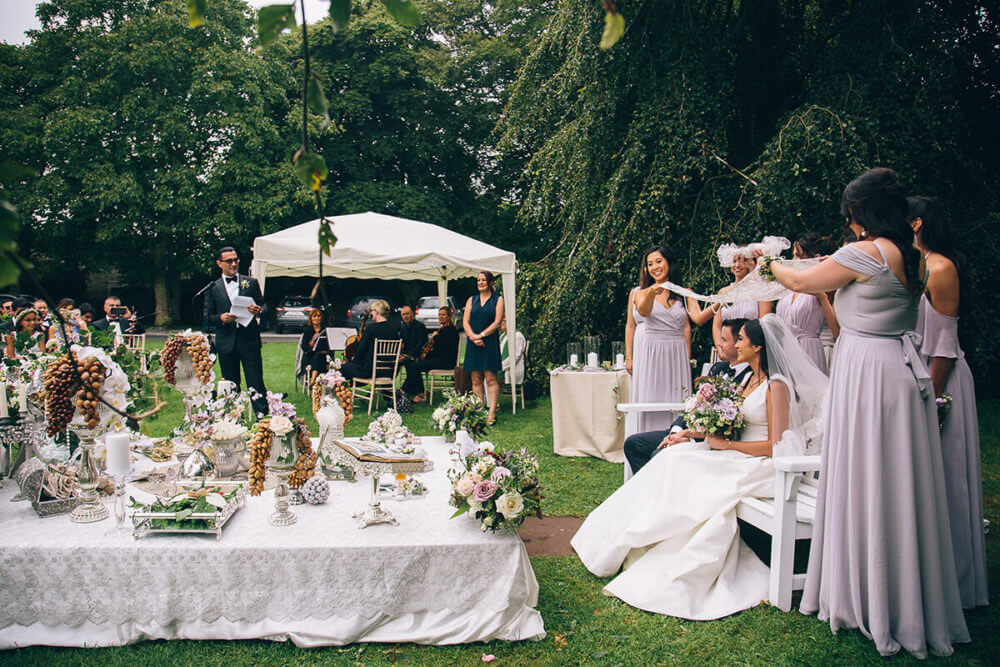
Photo by Siobhan Byrnne
Humanist
You may or may not have heard this term while planning your ceremony. A humanist ceremony is different than the above in that it is a non-religious ceremony. There is no restriction on location, who can perform the ceremony, and there’s no set guidelines or script like in a traditional ceremony. You don’t want to exchange rings? In a humanist ceremony you don’t have to! Don’t want to repeat or say vows? Have them expressed a different way. This is the “no rules” ceremony style, where you can completely create it from scratch to exactly what you both want. A humanist ceremony generally doesn’t work in the legal paperwork side of marriage either; it’s done usually before or after the ceremony quietly by the couple on their own.
The Pros: If you’re a creative person or just detest the formality of traditional weddings and aren’t spiritual in any way, this is the option for you. It really enables you to dream big and create a completely personalized event.
How We Can Help: You dream it, we can help make it happen! We’re happy to help you brainstorm ideas, finds the right vendors to bring your vision to life, bring in special details, and get the perfect photographer to document the day!
Civil
A civil or legal ceremony is one that is not spiritual or religious in nature. It is usually performed by a government official or civil servant licensed to carry on marriages. They can be held in government buildings like City Hall, or outdoors with a licensed officiant. A civil ceremony will follow a structure: procession, opening words, vows, rings, pronouncement, “you may kiss”, closing, recession. There is room to add some spiritual or religious elements (ex. reading a quote from the Bible in the opening), but the overall tone is not religious or spiritual. Couples may repeat the traditional vows or are welcome to say their own. You can personalize this ceremony with the music choices, adding readings or poems, simple unity gestures like lighting a unity candle. There won’t be any overt cultural or religious elements usually.
The Pros: For the couple that isn’t terribly religious or spiritual nor really looking to incorporate any ethnic or cultural traditions, this ceremony style is a nice, clean option. There’s some room to personalize it. The structure can be appealing for couples that just want something straight-forward. Civil ceremonies offer the flexibility to choose different locations. Many couples in Ireland choose to host their civil ceremony in a different part of their reception venue — ex) ceremony in the castle garden and reception in the dining room — making the transition to the reception quite easy for them and their guests.
How We Can Help: Getting married abroad can have some challenges in getting the correct paperwork and legal aspect done properly. Waterlily Weddings is happy to help guide you through this process so it is stress-free and you can focus on the fun parts of wedding planning!
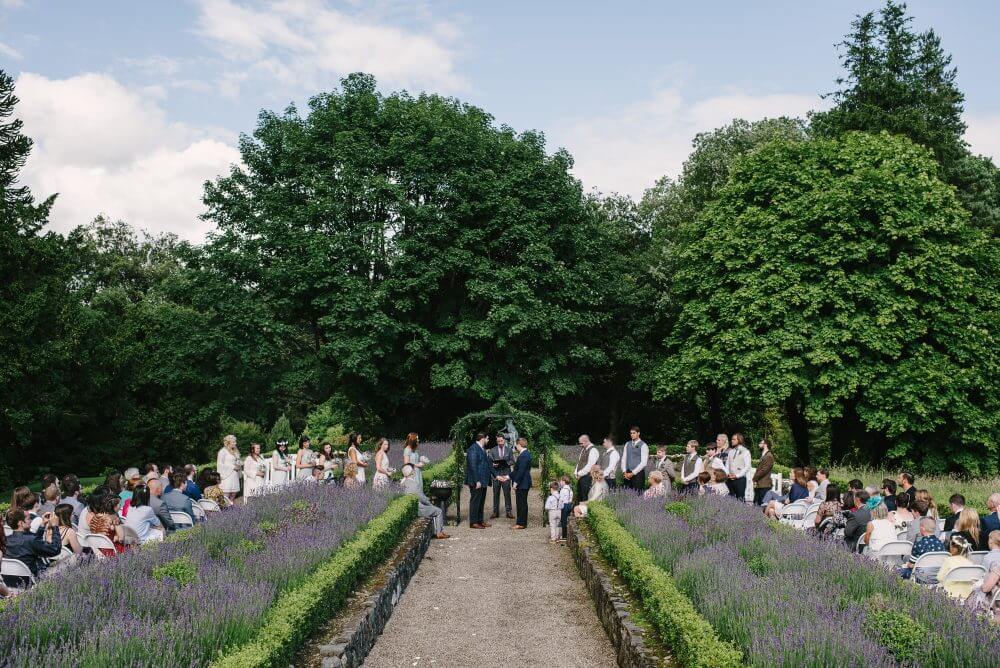
Photo by This Modern Love Photography
Bespoke
Religious. Cultural. Spiritual. Ancient. Meaningful but not too much. Toned-down but not dry. Something unique that’s not weird or cliche. It’s possible none of the above fit you and you like a little bit of everything, or nothing from any of them! A bespoke wedding ceremony is one that is completely uniquely designed just for you. From beginning to end, you choose the pace and style and vibe of your ceremony. Maybe you want to create some new traditions. Maybe you want to combine a bit to make something that works for you both.
The Pros: This is the creative couple’s dream option. Every element can be carefully and uniquely conceptualized around you.
How We Can Help: First, drawing out your vision and into a workable outline that your vendors can follow. Next, sourcing the items and vendors needed to support your vision. Finally, being there that day to see it all come together.
Think about stands out for you. What makes you feel complete, fulfilled, and puts a smile on your face. If it’s one in particular that stands out great; if it’s a bit of everything that’s fine too! The important thing is whatever ceremony you choose, you both need to feel connected to it.
comments +